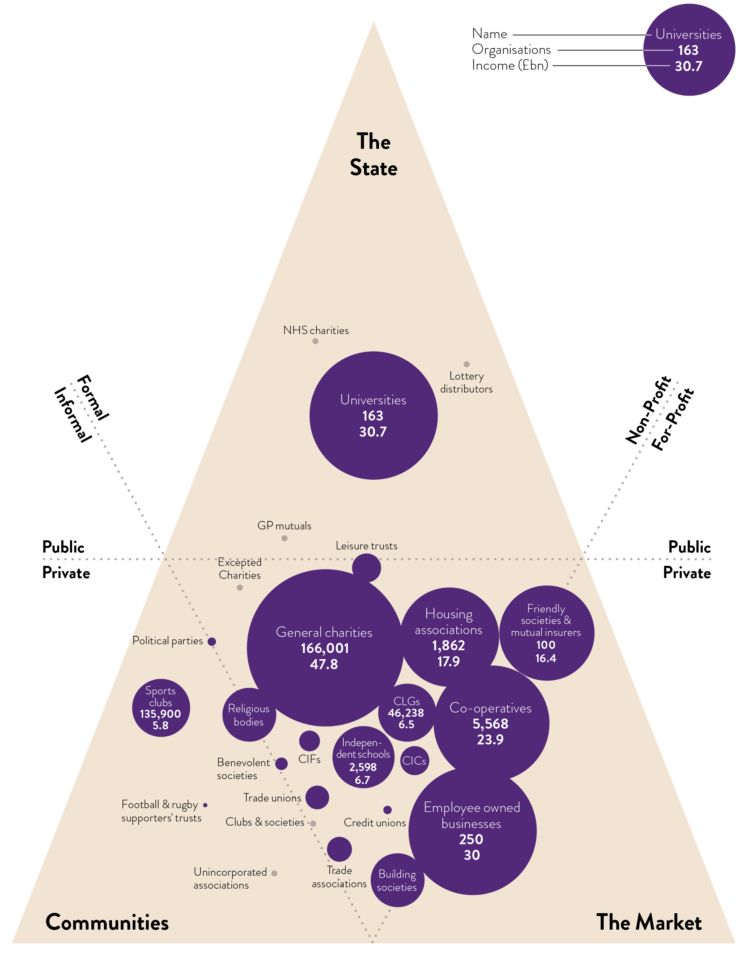We need to crack the higher education echo chamber we find ourselves in if we are to truly make positive changes in our communities and wider society.
I’ve recently been to a couple of events and responded to a consultation that drive home the point that we, as higher education providers, are excellent at talking to ourselves rather than others.
This is not to say that universities of all shapes and sizes do not do excellent work with, for and in their communities, regions and internationally (as Universities UK’s website highlights). And there are initiatives at a national level, such as the Civil University Commission, that are taking steps in exploring how institutions fulfil their civic roles.
But such initiatives can risk of becoming an exercise in us talking to ourselves about how good we are rather than genuine, multilateral engagement and therefore reducing the positive contributions that we can make.
University mystery

Image at: https://data.ncvo.org.uk/a/almanac18/what-is-civil-society-4/
The recent consultation on the Civil Society Strategy is such an example. It’s really worrying that there is no reference to the importance of higher education in the framing document when universities play a fundamental role in civil society (as the NCVO infographic shows).
I’d go further and say that small and specialist universities, in particular, add to the diversity of their communities, supporting their local socioeconomic conditions through teaching, research and knowledge exchange. As one of our members states: “Serving the common good is one of the three pillars of our mission and our long-standing commitment to delivering values-led higher education places people and communities at the heart of our activities.”
So why was such an omission made in this consultation? Is it a simple oversight? Or is it more sinister, symbolic of a disconnect between universities and wider civil society?
As I’ve hinted, the fault partly lies with us. We are good at sharing expertise and experiences between ourselves as a sector and with many parts of national and regional government. But we are not always as good as funding it nationally or locally – a case in point being the continued failure of the Higher Education Innovation Fund to invest in small and specialist universities in ‘left behind’ areas of England, which I’ve blogged about previously.
And at local levels, how good are we at sharing our expertise with our immediate communities? Are we listening to their needs? Are we being good neighbours?
Promising practice
There is evidence of promising practice. The National Coordinating Centre for Public Engagement, for example, provides some excellent examples and their work is well worth exploring.
Within GuildHE’s membership, we’ve developed an Active Citizenship Charter. The six pillars (Volunteering, Democratic Engagement, Environmental Sustainability, Community Engagement, Global Citizenship, Reflection & Development) are intended to enable universities to reflect on the practices at their institution and to develop the students of today into the employees, employers, parents, carers, leaders and citizens of tomorrow.
And though our Research Network (CREST), we are funding two projects that represent a mix of partnerships developed by universities, traditional charities and social enterprise together in order to address local and industrial challenges.
We’re not the only organisation to be experimenting in this way but even great initiatives such as Connected Communities, are not yet mainstream and are particularly hard to find when coming from outside the locations where they operate and the higher education environment.
The national picture
National initiatives can help encourage behaviour. The 2014 Research Excellence Framework introduced the idea of measuring the “impact” of university research and as we prepare for REF 2021 institutions could be encouraged to reflect on work with their local community, particularly those that don’t usually engage with university activities. The evolving Knowledge Exchange Framework could be particularly promising if it seeks to genuinely engage and be developed with those from outside universities right at the start of the process.
These are crucial steps in the right direction although more clearly needs to be done given the increasing national focus upon the sector because universities are, rightly, being seen at the heart of the Industrial Strategy. We need to invest time, effort and resources in all our local relationships if we are to achieve the aims laid out in the four Grand Challenges.
So it’s the time for us to be disruptive; to get better at telling (and funding) our story locally and nationally; to push ourselves outside of our comfort zones.
Perhaps then we may crack the echo chamber and achieve positive changes we seek to make.
You can view GuildHE’s response to the Civil Society Strategy consultation here.

